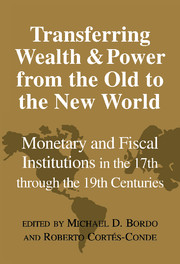 Transferring Wealth and Power from the Old to the New World
Transferring Wealth and Power from the Old to the New World Published online by Cambridge University Press: 27 March 2010
INTRODUCTION
There are many explanations for the emergence of the nation-state, and then perhaps many more that try to account for the subsequent material success of these nation-states. Sensibly, since of necessity most of these explanations are complex and roam over the whole range of religious, political, cultural, social, and economic factors. The purpose of this chapter, despite its fairly grand title, is much narrower. It is to investigate one area of explanation that has been offered and to follow a particular aspect of that explanation. The explanation is Douglass North's, on the rise of the West (North, 1981; North and Weingast, 1973). The particular aspect of that explanation is to consider how the core of North's thesis relates to the emergence of stable/successful fiscal and monetary institutions in England. Most of the explanations of the nation-state take some account of the fiscal dimension. Certainly, successful fiscal regimes underpin the role and scope of state activity. And stable monetary arrangements underpin economic growth. They do that by providing financial intermediation, which aids growth, and by contributing more generally to macrostability.
The chapter first sets out (Section 2.2) the essence of the North thesis as it relates to the emergence of institutions in England. This section outlines the role of property rights and transaction costs in the context of the origins of growth in England. Evidence on these aspects is not easy to provide, but the concepts are insightful and suggestive and we try to illustrate how.
To save this book to your Kindle, first ensure [email protected] is added to your Approved Personal Document E-mail List under your Personal Document Settings on the Manage Your Content and Devices page of your Amazon account. Then enter the ‘name’ part of your Kindle email address below. Find out more about saving to your Kindle.
Note you can select to save to either the @free.kindle.com or @kindle.com variations. ‘@free.kindle.com’ emails are free but can only be saved to your device when it is connected to wi-fi. ‘@kindle.com’ emails can be delivered even when you are not connected to wi-fi, but note that service fees apply.
Find out more about the Kindle Personal Document Service.
To save content items to your account, please confirm that you agree to abide by our usage policies. If this is the first time you use this feature, you will be asked to authorise Cambridge Core to connect with your account. Find out more about saving content to Dropbox.
To save content items to your account, please confirm that you agree to abide by our usage policies. If this is the first time you use this feature, you will be asked to authorise Cambridge Core to connect with your account. Find out more about saving content to Google Drive.